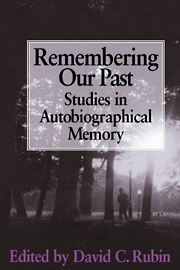Book contents
- Frontmatter
- Contents
- List of contributors
- 1 Introduction
- Part I Approaches
- Part II Accuracy
- Part III Emotions
- Part IV Social functions
- Part V Development and disruption
- 14 Remembering, recounting, and reminiscing: The development of autobiographical memory in social context
- 15 Intersecting meanings of reminiscence in adult development and aging
- 16 Schizophrenic delusions and the construction of autobiographical memory
- Subject index
- Author index
15 - Intersecting meanings of reminiscence in adult development and aging
Published online by Cambridge University Press: 14 October 2009
- Frontmatter
- Contents
- List of contributors
- 1 Introduction
- Part I Approaches
- Part II Accuracy
- Part III Emotions
- Part IV Social functions
- Part V Development and disruption
- 14 Remembering, recounting, and reminiscing: The development of autobiographical memory in social context
- 15 Intersecting meanings of reminiscence in adult development and aging
- 16 Schizophrenic delusions and the construction of autobiographical memory
- Subject index
- Author index
Summary
The cognitive revolution that began in the late 1960s (Neisser, 1967) led to drastic changes in models for the acquisition, storage, and retrieval of information. For lifespan developmental psychologists, the issues were particularly complex because developmentalists seek not only to specify models of how the mature organism accomplishes the various tasks of adaptation, but also to construct valid accounts of how systems develop over time, to identify how systems are maintained across the adult years, and to determine what happens to them as the organism ages.
Volumes of research have been generated in an effort to accomplish this agenda, but fairly early on in the process some developmentalists with interests at various stages of the life span perceived significant problems (Meacham, 1977; Riegel, 1976). Most developmental researchers viewed the memory system in the context of 19-year-old college freshman performing tasks designed to test the memory system under maximum load and independent of contextual supports. The very nature of tasks such as attempting to memorize a list of 40 words after one presentation seemed an unlikely yardstick for comparing individuals of varying developmental levels.
Similarly, many cognitive psychologists sensed that there were aspects of memory and cognition that might be overlooked if the field relied on traditional methodologies. Neisser (1978) urged psychologists to draw research problems from the real world so that their work would possess ecological validity.
- Type
- Chapter
- Information
- Remembering our PastStudies in Autobiographical Memory, pp. 360 - 383Publisher: Cambridge University PressPrint publication year: 1996
- 37
- Cited by



